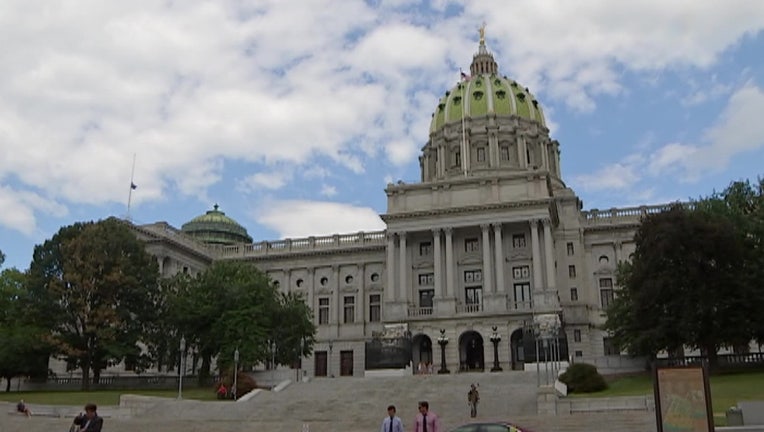Pennsylvania to begin fiscal year without a budget

HARRISBURG, Pa. - Pennsylvania's new fiscal year will begin without a state budget in place, as Gov. Tom Wolf’s administration and top Republican lawmakers haltingly worked through Thursday's deadline to hammer out a roughly $42 billion spending plan whose details were still largely being kept secret.
Negotiators had yet to fully brief rank-and-file lawmakers on any sort of agreement or publish the details of hundreds of pages of budget-related legislation that typically underpin such a spending plan.
Efforts to settle final details in the sprawling budget package came with 11th-hour wrangling over a number of issues, including pressure by Republicans for Wolf to agree to election-related legislation that has roots in former President Donald Trump's baseless claims Democrats stole the 2020 election.
The state’s bank account is flush with billions in extra cash — tax receipts boosted by inflation and an economy juiced with federal pandemic subsidies — but the extra money in a state accustomed to deficits hasn't necessarily solved problems.
Without new budget legislation signed into law by Friday, the state will lose the authority to make some payments, although a stalemate must typically last several weeks before any effect on services is felt.
Both the House and Senate scheduled weekend voting sessions in an effort to finish a budget package before Independence Day.
Missing the budget deadline has revived memories of protracted, monthslong budget fights between Wolf and the Republican-controlled Legislature in 2015 and 2017.
Starting the fiscal year without a budget in place isn't "preferable, but the most important thing is to get it right and that's what we're doing," said Senate Appropriations Committee Chairman Pat Browne, R-Lehigh.
Negotiations in closed-door talks revolve around a substantial amount of new aid for public school s — albeit under half the amount Wolf sought in his February budget proposal — and various concessions by the Democratic governor to Republican lawmakers who control the Legislature.
New aid for public schools is expected to land at around $850 million, or about 10% more, lawmakers say. That is short of the almost $1.8 billion more that Wolf had initially requested for instruction, school operations and special education.
Nevertheless, Senate Minority Leader Jay Costa, D-Allegheny, called the $850 million "historic" and said he was comfortable with the path that budget talks are on.
New aid to schools also will include substantial sums for school security upgrades and school counselors or psychiatrists.
Despite billions in extra cash, budgetmakers have said they are not contemplating any sort of broad-based tax cut for Pennsylvanians on sales or income.
Rather, Wolf and Republican lawmakers have focused on cutting Pennsylvania's 9.99% corporate income tax rate, one of the nation's highest. Along with that, Wolf has sought changes to ensure more multistate corporations pay the tax.
In exchange for boosting aid to schools, Republican lawmakers sought concessions on various policy goals that Wolf had unilaterally pursued over Republican objections.
Those include Wolf’s plan to toll up to nine interstate bridges — which was blocked in a Thursday ruling by Commonwealth Court — and subject charter schools to stronger ethics, accounting and admissions standards.
Republicans have also pressed for an agreement on legislation to restrict third-party funding for county election offices and equipment — a throwback to GOP complaints that money from the nonprofit Center for Technology and Civic Life was heavily tilted to left-leaning counties to help Democrat Joe Biden win 2020's presidential election.
The movement fueled by Trump’s false claims of widespread voter fraud has latched onto the 2020 donations as one of its many grievances over how the election was conducted.
Money distributed by the Center for Technology and Civic Life came from Facebook founder Mark Zuckerberg, drawing the nickname "Zuckerbucks" from Republicans.
The center and county officials say counties received what they asked for, and Philadelphia's election officials have testified in a legislative hearing that elections in more heavily populated counties are more expensive to administer on a per-resident basis.
Another fight involves state aid for the University of Pittsburgh.
Abortion rights opponents in the House have held up the state's annual aid to Pitt, insisting the university first end its federally funded fetal tissue research.
The university historically has received aid every year from the state, and Wolf has proposed $162.5 million for it, a 5% increase.
The university says fetal tissue research is critical to efforts to cure serious diseases, including Alzheimer’s, diabetes and Parkinson’s, and to helping to deliver healthy babies successfully.

